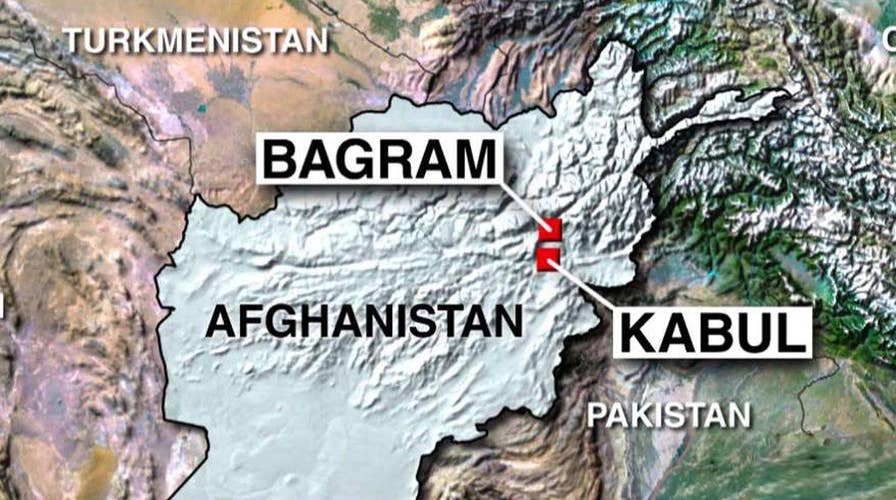Afghanistan: Six soldiers killed in bombing near US Air Base
NATO confirms six killed, six wounded, no word if any are US soilders
A suicide bombing near Bagram Airfield in Afghanistan killed six U.S. troops and wounded two other Americans and an interpreter, a senior U.S. defense official confirms to Fox News.
The Taliban claimed responsibility for the bombing, which was the largest attack on foreign troops in Afghanistan since August. The names of those killed have not been released.
It happened at around 1.30 p.m. local time in the vicinity of Bagram, the largest U.S. military facility in Afghanistan, according to U.S. Army Brig. Gen William Shoffner.
Mohammad Asim Asim, governor of Parwan province, where Bagram is located, said the bomber rammed an explosives-laden motorcycle into a combined NATO-Afghan foot patrol as it moved through a village close to the base, which is 28 miles north of Kabul.
It is the first major attack on a NATO military convoy since August 22, when three American contractors with the Resolute Support base were killed in a suicide attack on their convoy in Kabul. On August 7 and 8, Kabul was the scene of three insurgent attacks within 24 hours that left at least 35 people dead. One of the attacks, on a U.S. special operations forces base outside Kabul left one U.S soldier and eight Afghan civilian contractors dead.
Monday's attack came as Taliban gunmen and government forces battled for control of a strategic district in the southern province of Helmand after it was overrun by Taliban insurgents, delivering a serious blow to government forces.
Mohammad Jan Rasulyar, Helmand's deputy governor, said insurgents took control of Sangin district on Sunday. Only Afghan army facilities in the district had not been taken by the insurgents, he said. Casualties among Afghan security forces were high, he added, though he gave no figures.
Afghan Army commandoes and special forces had arrived in Sangin to push a counter-offensive, the Defense Ministry spokesman, Dawlat Waziri, said. He told reporters the Afghan air force had conducted 160 combat and transport flights over Sangin in the past 48 hours.
Among the insurgent forces in Helmand, "three out of 10 are foreign fighters," he said, adding that they included Pakistanis, Chechens, Uzbeks, Arabs and Chinese Uighurs. "The presence of the foreigners in this imposed war complicates the sitaution in Helmand," he said, echoing the government line that the war is run by a Taliban leadership believed to be based in Pakistan with official protection.
Helmand is an important Taliban base as it produces most of the world's opium, a crop that helps fund the insurgency.
Sangin district has bounced in and out of Taliban control for some years, and fighting there has produced high casualties among both Afghan and international forces. British forces in particular saw intensive fighting there at the height of the war in 2006 and 2007. Britain lost more than 450 troops during its combat mission in Afghanistan, more than 100 of them in Sangin.
Helmand's deputy governor Rasulyar on Sunday took the unusual step of using his Facebook page to warn President Ashraf Ghani that the entire province of Helmand was in danger of falling to the insurgents if central authorities failed to send help.
In Helmand, more than 90 members of the Afghan security forces died fighting in the two days before his Facebook plea, with hundreds killed in the past six months, he said in his open letter to Ghani.
Important districts across Helmand province, including Nad Ali, Kajaki, Musa Qala, Naw Zad, Gereshk and Garmser, have all been threatened by Taliban takeover in recent months. Insurgents are also believed to be dug in on the outskirts of the provincial capital, Lashkar Gah.
Taliban fighters, sometimes working with other insurgent groups like the Islamic Movement of Uzbekistan, have managed to overrun many districts across the country this year, as well as staging a three-day takeover of the major northern city of Kunduz. They rarely hold territory for more than a few hours or days, but the impact on the morale of Afghan forces is substantial.
The war has intensified since the announcement in late July that the founder and leader of the Taliban, Mullah Mohammad Omar, had been dead for more than two years. His deputy, Mullah Akhtar Mansoor, succeeded him, causing internal ructions and delaying the likelihood that a peace dialogue with the Afghan government, halted after the announcement of Mullah Omar's death, will restart in the foreseeable future.
The Pentagon released a report last week warning that the security situation in Afghanistan would deteriorate as a "resilient Taliban-led insurgency remains an enduring threat to U.S., coalition, and Afghan forces, as well as to the Afghan people."
The U.S. now has about 9,800 troops in Afghanistan, some of which are involved in counterterrorism missions. With NATO contributions, there are about 13,000 foreign troops in Afghanistan.
Fox News' Jennifer Griffin and The Associated Press contributed to this report.

